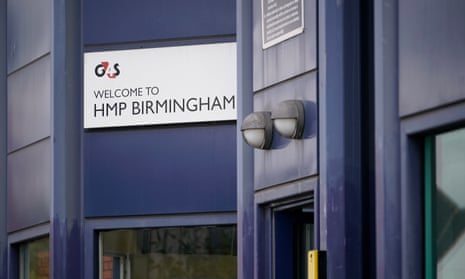Private prisons are more violent than public jails, according to data analysis that raises questions over the government’s plans to pursue its prisons-for-profit model.
In the year to September 2018, there were 156 more assaults per 1,000 prisoners in private adult prisons in England and Wales than in their publicly run counterparts.
The total number of assaults in prisons for the year to September 2018 and the average number of prisoners within each establishment for the same period were provided to the shadow justice secretary, Richard Burgon, after two parliamentary questions.
In 96 publicly run adult jails, there was an average population of 64,905, with 21,420 assaults – or 330 per 1,000 prisoners.
But in 14 privately managed adult prisons, there was an average of 15,930 prisoners and 7,737 assaults – or 486 per 1,000 prisoners.
Despite this, the Ministry of Justice (MoJ) plans to build more prisons for private operation. Two announced sites – HMP Glen Parva in Leicestershire and HMP Wellingborough in Northamptonshire – are to be privately run. Work on Wellingborough, which will hold nearly 1,700 inmates, is scheduled to start next month.
Further analysis shows that despite comprising just 14 of the 110 adult prisons, private jails are disproportionately represented among the most violent prisons.
Labour is calling for an independent inquiry into the privatisation of prisons.
Burgon said: “These figures will further fuel fears that privatisation is leading to corners being cut as private companies treat our prisons system as a money-making exercise.
“The fiasco with G4S at Birmingham prison should have been the final nail in the coffin for private prisons. Yet the Tories are set to carry on regardless, with even more private prisons in the pipeline.
“The government should now halt those plans and establish an independent inquiry into the dangerous threat posed by privatisation in our prisons system.
“Labour has made it clear that in office, we will scrap privately run prisons. The Tories should follow Labour’s lead and drop its ideological obsession with privatisation.”
Private sector involvement in the running of jails is controversial. Last month, the government permanently stripped G4s of its contract to run HMP Birmingham, after an inspectorate found the jail to be violent and drug-ridden.
However, given Birmingham was still privately run in the period covered by the data, it is included as a private jail for the purposes of the following analysis.
Three of the 10 most violent adult jails in the period – or 30% – were privately run. They were Birmingham, Doncaster and Peterborough.
Looking deeper at the data, further evidence that private prisons are more violent emerges.
Local jails house prisoners that are taken directly from nearby courts, either after sentencing or when on remand. They are also the most violent, with the greatest number of assaults. The number of assaults in these prisons in the year to September 2018 was 15,644 – 48% of the total.
Within the 14 private prisons, five are male-only local jails. The private male local prisons had 701 assaults per 1,000 prisoners in the period, compared with 493 per 1,000 prisoners in the 28 publicly run male local prisons.
Currently, G4S, Serco and Sodexo run private prisons in England and Wales, all of which are in the running for the new jails at Wellingborough and Glen Parva, according to a written answer by the justice minister, Lucy Frazer.
A number of the private jails have received praise from the prisons inspectorate, including G4S’s HMP Oakwood, which was described as an “impressive institution” with “courageous leadership”.
John Whitwam, the managing director of G4S custodial and detention services, said: “G4S has invested heavily in innovative initiatives to reduce violence in our prisons, such as peer-led mentoring, family interventions and personalised management plans for men with complex needs, which are widely praised by independent inspectors.
“HMP Oakwood and HMP Altcourse remain two of the top-performing prisons in the UK, and we are committed to working with the Ministry of Justice and other relevant bodies to continue this good work.”
Wyn Jones, Serco’s custodial operations director, said: “Serco runs prisons for the Ministry of Justice that hold prisoners convicted of serious offences, and to compare these with the public sector, which includes many lower security and open prisons, is neither fair, balanced, nor valid as it does not compare like for like.
“We have invested in many technological and cultural innovations over the last 20 years and our officers work extremely hard to address violent behaviour in prisons, which is a problem across the country.”
A spokesperson for Sodexo said: “Violence is a well-documented issue across all prisons and Sodexo prisons are not immune to this. Great care must be taken when interpreting comparative data – Sodexo run some of the largest, busiest and most complex prisons in the country, with challenging populations.
“We successfully deliver a full regime at all our prisons, which provides extensive opportunities for interaction between prisoners and staff, which is in accordance with our contractual obligations. We constantly review our activities to respond to the frequently changing factors which drive violence.”An MoJ spokesperson said: “Tackling violence is a challenge not just in privately run prisons, but across the entire prison estate, and we are working together to find solutions.
“The Ministry of Justice is spending an extra £70m to improve safety and security, and has recruited over 4,700 more prison officers since late 2016, when the government announced an annual increase of £100m in the prisons budget.”
